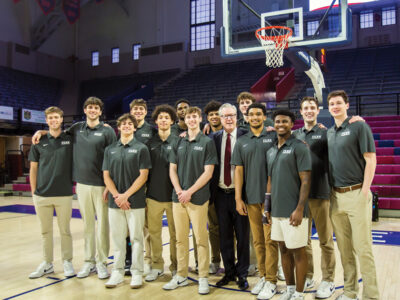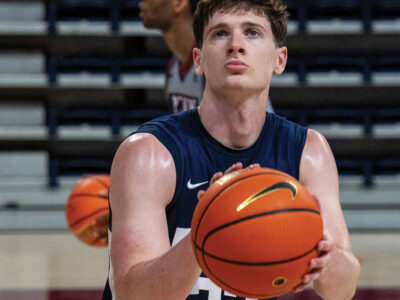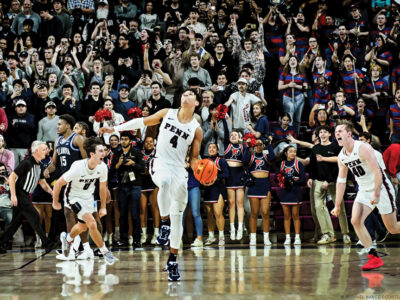Why can’t the Ivy League be as accommodating as the Big 5?
By David Porter
Normally at the two-thirds point of a season, Penn’s men’s basketball team is looking forward to the relative comfort of its Ivy League schedule after being cuffed around by its local rivals in Philadelphia’s Big 5. But that formula has been turned on its head this season, as the Quakers ruled the city but found their Ivy experience anything but comfortable. The result was that they entered the final three weekends of Ivy play facing an uphill climb to their 19th league title.
There were many peaks during December and January, but perhaps none higher than what occurred in North Philadelphia on January 29. A talented but underachieving La Salle team had erased all of a 19-point first-half lead and forced overtime, and the howling crowd at Tom Gola Arena fully expected the Explorers to ride the momentum to a come-from-behind victory. But this edition of the Quakers is nothing if not capable of brushing off such distractions. Junior forward Koko Archibong dealt the first blow with a monstrous, windmill dunk that started from the left wing and seemed to scrape the ceiling before it plunged through the net. That gave the Quakers a 71-67 lead, and junior guard Andy Toole combined with sophomores Jeff Schiffner and Charlie Copp to hit 10 consecutive free throws in the final minute. Take a moment to digest the second half of that sentence: Penn made all 10 of its free throws down the stretch. That alone qualified as something momentous for a team whose fickle foul-shooting has been an occasional sore point.
The La Salle victory was also significant in that it gave the Quakers their first undisputed Big 5 title in 28 years. They accomplished this by defeating St. Joseph’s, Temple, and Villanova before beating La Salle. It was the first time they’d beaten all four city schools in one season since the Chuck Daly-coached squad did it in 1973-74, and if Drexel were counted to make it the Big 6, Penn would have been 5-0, courtesy of an 89-80 win over the Dragons in November. To add more perspective to the feat, consider that Penn had won just five of its last 20 games in the Big 5 before this season, and that the Jerome Allen/Matt Maloney and Michael Jordan/Matt Langel teams of 1994-95 and 1999-2000, respectively, went a combined 28-0 in the Ivy League but were 2-6 in the Big 5 during those two seasons.
In an odd way, the Quakers may have Davidson College to thank. The Wildcats came to the Palestra on December 22 and overcame a 14-point second-half deficit to jolt Penn in overtime, 75-71. Stung by the loss, the Quakers won nine of their next 10 games, which included wins against Temple, St. Joseph’s, and La Salle.
“Davidson was the game that really stuck in our craw,” coach Fran Dunphy said. “We had that one and we gave it back to them.”
There was no shortage of tense moments on the way to the Big 5 title: Temple cut a 19-point lead to six before succumbing, 68-62, on December 30, and St. Joseph’s had the winning basket waved off at the buzzer in a 62-60 Penn win on January 26. The St. Joseph’s game featured extra drama provided by Penn junior Ugonna Onyekwe, who missed six consecutive free throws in the final 29 seconds with the Palestra crowd hyperventilating with each shot.
“Everybody’s joking about it now,” a relieved Onyekwe said later, “but if we had lost it would have been a different story.”
Penn’s local successes notwithstanding, it is the Ivy League that holds the key to the NCAA Tournament, and though the players will pay lip service to the history and tradition of the Big 5, they know that when all is said and done it still is a mythical title that confers no more than city bragging rights. And after splitting its first two Ivy weekends, Penn had little to brag about and a lot of ground to make up.
The Quakers’ 2-2 start in the league, though, must be considered in the context of the new, improved Ivy League. For the first time in recent memory, the league has five teams, possibly six, that are capable of winning the championship. The Penn-Princeton duopoly that has dominated the Ivies since the late 1960s was in jeopardy as of this writing, as the rest of the league appeared to have awakened from its decades-long slumber and actually fielded competitive squads. Yale defeated Penn State and Clemson, both on the road, early in the season; Brown knocked off Rhode Island and Providence; and Columbia, featuring five returning starters, hung with UCLA before losing by nine in Los Angeles.
It was Columbia that sank a dagger into the Quakers on the night of February 2 with a 54-53 upset at the Palestra that an emotional Armond Hill later called his biggest win as a coach. The Lions pressured Penn into 41-percent shooting, crashed the boards, and generally disrupted the Quakers’ offensive flow all evening. Trailing by a point with three seconds left, Onyekwe caught Schiffner’s in-bounds pass and maneuvered to get an open three-pointer, but his effort rimmed out, and he and the rest of the Quakers were treated to the sight of the Lions rushing the floor to celebrate their first win at the Palestra since 1990. The loss, which came one night after a 75-63 win over Cornell, left Penn trailing Princeton (4-0), Yale (5-1), Harvard (4-2), and Brown (4-2), with road games at New Haven, Providence, and Princeton upcoming.
For all the unaccustomed uncertainty in the Ivy League race, positives abounded during the middle stretch of the season. The victory over Temple, Penn’s second in 20 tries against the Owls, came during Toole’s four-game absence after foot surgery, and he returned to the lineup with no visible ill effects. Schiffner sank five three-pointers and scored 20 points in a 16-point win at Dartmouth, and sophomore center Adam Chubb came off the bench to score 13 points (including two dunks) against La Salle. The Onyekwe-Toole-Archibong triumvirate in various combinations carried the team throughout.
“The good thing is, our destiny is in our hands,” Dunphy said after the Columbia loss, fully aware that for the first time in a long time, there are more than two pairs of hands in this race.
To borrow an over-used phrase that began its life as the state motto of New Jersey, senior wrestler Yoshi Nakamura and Penn are perfect together. Their match made in heaven was consummated four years ago when Nakamura, a two-time scholastic state champion from Elyria, Ohio, eschewed scholarship offers from wrestling powers in the ACC and Big Ten for four years in West Philadelphia.
“What I valued was my education, and getting an Ivy League education was at the top of my list,” Nakamura said. “Penn has something to offer that not many schools can offer—great athletics and great academics. I’m getting my degree from Wharton in May; you can’t ask for more than that.”
Nakamura has more than held up his end of the bargain. On January 28, the 157-pounder became the third Penn wrestler to reach 100 career victories, putting him in company with 2000 NCAA champion Brett Matter W’00 and 2000 Olympic champ Brandon Slay W’98. Perhaps as important, win No. 100 came against Shane Roller of Oklahoma State, who had dealt Nakamura his only defeat of the season.
Proving that good things come in twos, teammate and fellow senior Rick Springman was one shy of his 100th win after defeating Cornell’s Jim Stanec at 174 pounds in a 21-9 Quaker win at the Palestra February 2. With the win, Penn improved its overall record to 5-4, 2-0 in the Ivy League.
Nakamura and Springman have much to do before adding a Penn degree to their resumes. There are the EIWA championships at Lehigh University on March 9, where both are former champions, and later in the month the NCAA championships at Albany, N.Y., where the No. 3-ranked Springman and No. 2-ranked Nakamura each hopes to write his own perfect ending.
David Porter C’82 writes about sports for the Gazette; he is the author of Fixed: How Goodfellas Bought Boston College Basketball.




